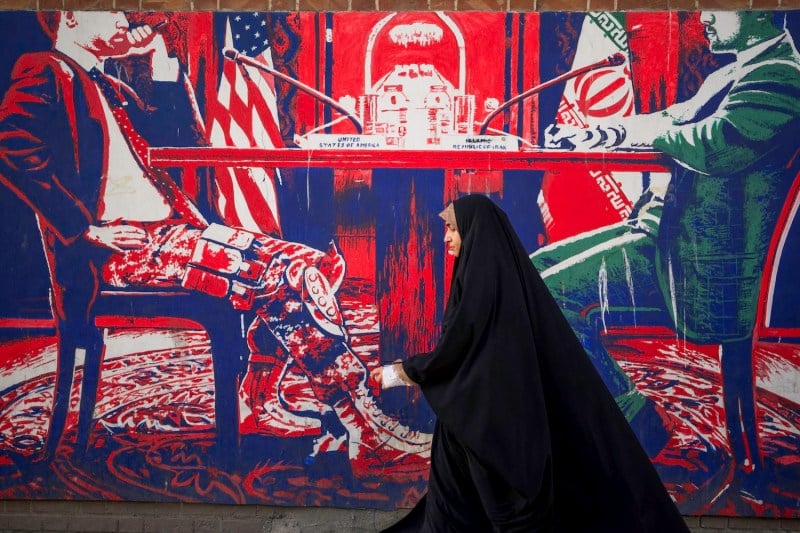California Sues Trump Over National Guard Deployment

California Sues Trump Over National Guard Deployment
Protests against the White House’s immigration policies have rocked Los Angeles.
Demonstrators protest outside a downtown jail in Los Angeles following two days of clashes with police on June 8. Spencer Platt/Getty Images
Welcome back to World Brief, where we’re looking at immigration protests in California, Israel’s continued restrictions on aid entering Gaza, and U.S.-China trade talks.
Threats of Arrest
California state officials on Monday announced plans to file a federal lawsuit against U.S. President Donald Trump and Defense Secretary Pete Hegseth over the president’s decision to deploy the National Guard to Los Angeles without first consulting California Gov. Gavin Newsom.
Welcome back to World Brief, where we’re looking at immigration protests in California, Israel’s continued restrictions on aid entering Gaza, and U.S.-China trade talks.
Threats of Arrest
California state officials on Monday announced plans to file a federal lawsuit against U.S. President Donald Trump and Defense Secretary Pete Hegseth over the president’s decision to deploy the National Guard to Los Angeles without first consulting California Gov. Gavin Newsom.
Tensions began on Friday, when small protests took place in Los Angeles against U.S. Immigration and Customs Enforcement (ICE) raids. At the largest protest, dozens of demonstrators gathered outside the Los Angeles Federal Building to demand the release of 44 people who had been detained in immigration raids across the city that day. Officers from the U.S. Department of Homeland Security and Los Angeles Police Department took action to disperse the demonstrators, some of whom scrawled graffiti on the building’s walls, and arrested more than 100 people.
The next day, clashes broke out between protesters and law enforcement in the city of Paramount, about 20 miles south of downtown Los Angeles, as well as in nearby Compton, over rumors that another immigration raid was planned in the area. The New York Times reported that protesters kicked and threw objects at law enforcement vehicles, and officers deployed tear gas against the demonstrators. As the situation escalated, Trump issued a memo on Saturday evening ordering at least 2,000 members of the National Guard to Los Angeles to protect ICE officers and other federal officials as well as federal property.
U.S. border czar Tom Homan warned California residents on Saturday that federal agents would arrest anyone who obstructs Trump’s immigration enforcement efforts, implying that the threat also included Newsom and Los Angeles Mayor Karen Bass. “I’ll say it about anybody: You cross that line; it’s a felony to knowingly harbor and conceal an illegal alien,” Homan said. Los Angeles is a sanctuary city with policies that limit cooperation with federal immigration officials.
When demonstrations continued for a third day on Sunday, the Trump administration deployed around 300 National Guard members to protect the city’s federal buildings, including Los Angeles’s detention center, where many protests were concentrated. The White House claims that military mobilization is legal via a rarely used law that grants the president the right to mobilize the National Guard if there is “a rebellion or danger of a rebellion against the authority of the government.”
However, Newsom maintains that “commandeering a state’s National Guard without consulting the governor of that state is illegal and immoral.” The California governor issued a letter on Sunday urging Trump to rescind his National Guard order. “We didn’t have a problem until Trump got involved,” he wrote. “This is a serious breach of state sovereignty—inflaming tensions while pulling resources from where they’re actually needed.”
When Trump refused, Newsom and California Attorney General Rob Bonta announced their intention to file a lawsuit against the White House. And on Monday, Newsom called Homan’s bluff to arrest him, saying “just get it over with.” Trump appeared to support such an action, telling reporters on Monday that “I would do it if I were Tom.”
By the end of the day on Monday, 2,000 National Guard members were deployed to California to help quell the unrest, and an additional 700 Marines were ordered to support the troops.
California’s uproar over Trump’s immigration policies comes the same day that the White House’s massive travel ban goes into effect. The sweeping restrictions target 12 countries across the Middle East, Africa, Southeast Asia, and the Caribbean, with separate additional constraints on seven other nations.
Today’s Most Read
- Syria’s Islamic State Is Surging by Charles Lister
- The Other Side of Deportation by Michael Scott Moore
- Xi Jinping’s Family Fortunes by Lucy Hornby
The World This Week
Tuesday, June 10: Argentine President Javier Milei begins a three-day trip to Israel.
German Chancellor Friedrich Merz hosts Dutch Prime Minister Dick Schoof.
Caretaker Bangladeshi leader Muhammad Yunus begins a four-day trip to the United Kingdom.
European Commission President Ursula von der Leyen hosts Indian Foreign Minister S. Jaishankar in Brussels.
Wednesday, June 11: The Polish parliament holds a vote of confidence.
Thursday, June 12: Italian Prime Minister Giorgia Meloni hosts NATO Secretary-General Mark Rutte.
Saturday, June 14: The United States holds a military parade in Washington.
Sunday, June 15: Canada hosts the three-day G-7 leaders’ summit.
French President Emmanuel Macron and Danish Prime Minister Mette Frederiksen pay a joint visit to Greenland.
The resignation of Israeli Shin Bet chief Ronen Bar goes into effect.
What We’re Following
Israel detains aid ship. Israeli forces seized a Gaza-bound civilian ship carrying aid on Monday and detained several of its passengers, including climate activist Greta Thunberg and a French member of the European Parliament. The Freedom Flotilla Coalition, which organized the Madleen’s voyage, said these individuals were “kidnapped by Israeli forces” in international waters while trying to deliver humanitarian assistance to Palestinians suffering a mounting hunger crisis.
“The ship was unlawfully boarded, its unarmed civilian crew abducted, and its life-saving cargo—including baby formula, food and medical supplies—confiscated,” the organization said in a statement.
The Israeli Foreign Ministry called the civilian ship a “selfie yacht” on Monday, adding that the activists would be returned to their home countries and the aid would be sent to Gaza via established channels. Israel has long maintained a naval blockade around Gaza and has only recently begun allowing humanitarian supplies to enter the territory, though the United Nations maintains that the controversial delivery system—led by the Israeli- and U.S.-backed Gaza Humanitarian Foundation—is inadequate and endangers Palestinian lives.
Foreign powers condemned Israel’s actions on Monday. The Turkish government claimed that seizing the ship while it was in international waters “threatens the freedom of navigation and maritime security.” The Spanish Foreign Ministry summoned the Israeli Embassy’s chargé d’affaires in protest, and French Foreign Minister Jean-Noël Barrot said Paris had warned Israel to “avoid any incident.”
Tariff talks. The United States and China held trade talks in London on Monday in an effort to ease tariffs before a 90-day suspension on hefty duties expires in August. “The purpose of the meeting today is to make sure that they’re serious, but to literally get handshakes,” White House economic advisor Kevin Hassett told CNBC on Monday.
Trump announced a pause on most 100 percent-plus levies on May 12 to allow for negotiations on export controls, largely concerning semiconductors and critical minerals. Then last Thursday, Trump spoke at length with Chinese President Xi Jinping during a phone call, after which the U.S. president claimed to have made progress on rare earth minerals and agreed to hold future trade negotiations. This week’s talks are expected to continue that conversation.
Easing trade tensions is of vital concern for both Washington and Beijing. According to U.S. customs data, Chinese exports to the United States dropped 34.5 percent year-on-year in May in value terms, the sharpest drop since the outbreak of COVID-19 in February 2020.
Largest bombardment yet. Russia launched nearly 500 drones at Ukraine in its largest overnight barrage since the war began, the Ukrainian Air Force said on Monday. Alongside 479 drones, Ukrainian troops recorded 20 missiles of various types, though only nine drones and one missile reportedly hit their targets. At least one person was killed in the bombardment, which centered mainly on Ukraine’s central and western regions.
Moscow has stepped up its aerial attacks on Ukraine in recent days, in apparent retaliation for Kyiv’s extensive drone assault on Russia’s long-range weapons capabilities last week. Experts worry that such operations could harm efforts to reignite peace talks. Russian President Vladimir Putin remains opposed to an in-person meeting with Ukrainian President Volodymyr Zelensky, and both sides refuse to concede to the other’s demands.
Still, earlier negotiations have yielded some success. Direct talks in Istanbul last week cemented a second prisoner exchange, which began on Monday. Zelensky confirmed that the return of “the wounded, the severely wounded, and those under the age of 25” will take place over the next several days, with an equal number of individuals to be released on both sides.
Odds and Ends
What do Pope Leo XIV, singer Dolly Parton, and Liverpool soccer player Mohamed Salah have in common? They were all the subject of vegetable-made sculptures at this year’s Lambeth Country Show in London. The two-day festival, held this past weekend, is an urban take on a rural tradition, during which contestants use maize (corn), butternut squash, and other healthy foods to depict iconic figures and events. It may sound corny, but locals attest that it’s an un-beet-able experience.
Alexandra Sharp is the World Brief writer at Foreign Policy. Bluesky: @alexandrassharp.bsky.social X: @AlexandraSSharp
Stories Readers Liked
In Case You Missed It
A selection of paywall-free articles

Four Explanatory Models for Trump’s Chaos
It’s clear that the second Trump administration is aiming for change—not inertia—in U.S. foreign policy.




















Join the Conversation
Commenting is a benefit of a Foreign Policy subscription.
Subscribe
Subscribe
Already a subscriber?
.
View Comments
Join the Conversation
Join the conversation on this and other recent Foreign Policy articles when you subscribe now.
Subscribe
Subscribe
Not your account?
View Comments
Join the Conversation
Please follow our comment guidelines, stay on topic, and be civil, courteous, and respectful of others’ beliefs.
View Comments
Change your username |
Log out
Change your username:
CANCEL
Confirm your username to get started.
The default username below has been generated using the first name and last initial on your FP subscriber account. Usernames may be updated at any time and must not contain inappropriate or offensive language.